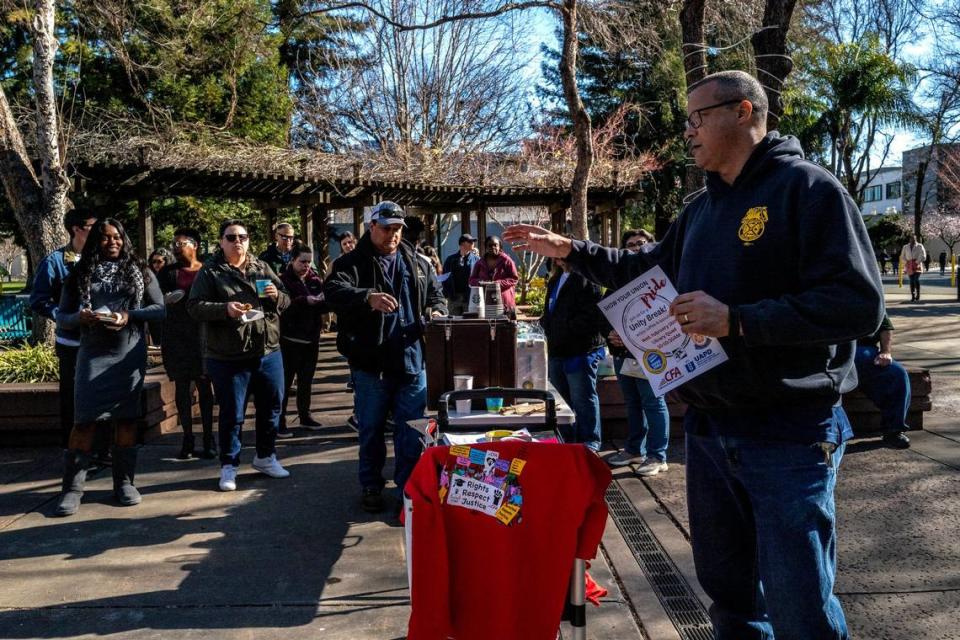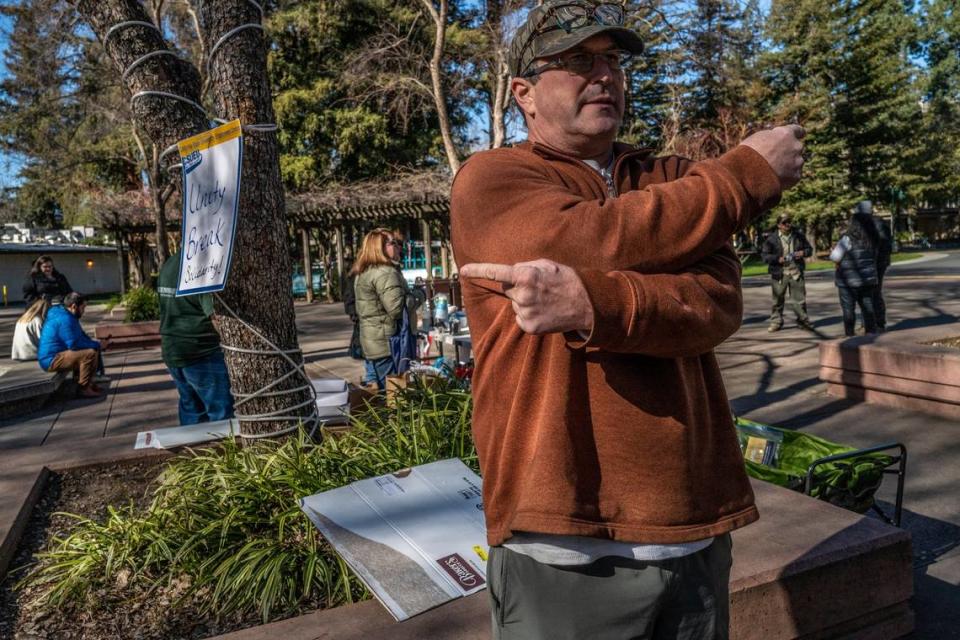California lawmakers know CSU workers are underpaid. So why haven’t they received raises?
Nearly 60,000 workers across California State University’s 23 campuses are demanding the university increase their pay and guarantee step raises so they won’t fall behind the market.
If the university won’t yield, workers like Matt Mason say they aren’t afraid to organize labor actions, including a strike larger than the one that upended classes and final exams at the University of California late last year.
“We want to restore fairness here at the CSU,” said Mason, an auto mechanic at Sacramento State and campus steward for Teamsters Local 2010. The 56-year-old has worked for the university for nearly 20 years and says his members have waited long enough for equitable wages.
“Everyone still has to have a second or a third job.”
Workers at 23 CSU campuses are bargaining for higher wages. Will they follow UC and strike?
Lawmakers and CSU officials have quarreled for years over whose responsibility it is to address low pay. The unions say this traps their members in the middle without salary boosts or guarantees of raises in the future.
A step-based raise system would guarantee workers raises after serving a certain number of years at the university. Some employees have worked at the CSU for over 15 years and still sit near the bottom of their salary range, unions say. They’ve also argued that CSU workers are some of the only state employees who don’t receive guaranteed step raises in their contracts.
The CSU Board of Trustees first eliminated salary steps for non-faculty staff in 1996 during bargaining, ending decades of seniority-based salary raises.
Since then, CSU worker wages have failed to keep pace with either the private sector or institutions of higher education in California and on the west coast, according to a state-funded compensation study.
The $2 million analysis found that the average worker earns about 12% below market rate. Some jobs, such as those in hospitality and guest services, are as much as 20% below comparable positions elsewhere.
Mason says he and his wife watch their money carefully and both work extra jobs to make ends meet. He fixes friends’ and family’s cars on the weekends, and she takes tickets at the Golden 1 Center part-time while also serving as an usher at their church.
Mason made close to $85,500 in base pay in 2021. But since he’s been a Sacramento State employee for 20 years, he says he would already be at the top rung of his pay scale under a step-based system — closer to $98,500.
CSU officials acknowledged the need for improvement.
“The CSU’s mission is in jeopardy if it is unable to recruit and retain qualified employees to serve its students and to fulfill the significant role that the CSU plays within California’s economy,” wrote Steve Relyea, executive vice chancellor and chief financial officer, in a letter to lawmakers and other state officials asking for funding.
Multiple bills to reinstate steps have been unsuccessful even after passing both legislative chambers. Gov. Jerry Brown vetoed a 2018 measure from Shirley Weber, then a member of the state Assembly, to guarantee CSU workers 5% raises every year. A year later, Gov. Gavin Newsom asked lawmakers to hold Weber’s reintroduction of the bill on the floor, effectively killing it, so that CSU could have a chance to resolve the issue in bargaining.
And last year, Newsom vetoed a watered-down version that would’ve given workers 5% raises after their first, second, third, fifth, seventh, ninth, 12th and 15th years of service.
The two governors’ messages were clear: resolve pay disparity issues in bargaining, and do it with the money that CSU already has available.
“Every year we bring up the steps, and every time it doesn’t pass, there’s more and more depression,” Mason said. “Morale is low, there’s no doubt about it.”
This year, seven unions have formed the “CSU Labor Coalition” to change how the CSU attracts and retains talent. They represent many of the workers who keep the system operating: auto mechanics, laboratory technicians, maintenance engineers and financial aid counselors, to name a few.
“We are supporting each other. The CSU is not going to pit us against each other,” said Catherine Hutchinson, president of California State University Employees Union, at a union rally in February. “We’re going to have each other’s backs.”
Although the CSU agrees with unions that workers are underpaid, the administration contests the labor coalition’s claim that job churn has created adverse working conditions for employees.
“We have no data to support assertions of high turnover,” wrote Michael Uhlenkamp, a university spokesperson, in a statement. Uhlenkamp said Chancellor’s Office data showed that staffing across the 23-campus system grew by 550 people from fall 2021 to fall 2022.
This bargaining year is critical, workers say.
CSU administrators say they’ve recently presented CSUEU in bargaining with a proposed framework for step-based raises but declined to say what the incremental pay increases would be. Whether the university will offer the same to the other unions negotiating step raises is unclear.
The union isn’t happy with the university’s proposal.
“The CSU proposal does little to nothing to establish longevity or stability for the workforce that serves students and faculty,” wrote CSUEU’s president Hutchinson in a statement. “One key recommendation from the Mercer salary study, commissioned by the CSU, is to create a steps system that gets employees to a competitive pay level in five years. Under the CSU proposal, workers will be chasing this elusive goal for the rest of their tenure at the University.“
The Teamsters proposed step raises to CSU in January during their first bargaining session. Five weeks later at their next meeting, according to the union, the university countered with an offer that would only grant 2% raises and didn’t include contract language. The Teamsters filed an Unfair Labor Practices charge against CSU last Monday for allegedly failing to bargain in good faith.
“We vehemently dispute the claim of unfair labor practices, and are committed to negotiating with Teamsters Local 2010 to reach an agreement that is in the best interest of both groups,” Uhlenkamp said in a statement Tuesday.
If bargaining doesn’t yield victories on wages, unions have suggested the possibility of striking.
“I hope we don’t have to strike,” said Jason Rabinowitz, secretary-treasurer for the Teamsters. “But that’ll be up to the state.”

 Yahoo Movies
Yahoo Movies 

